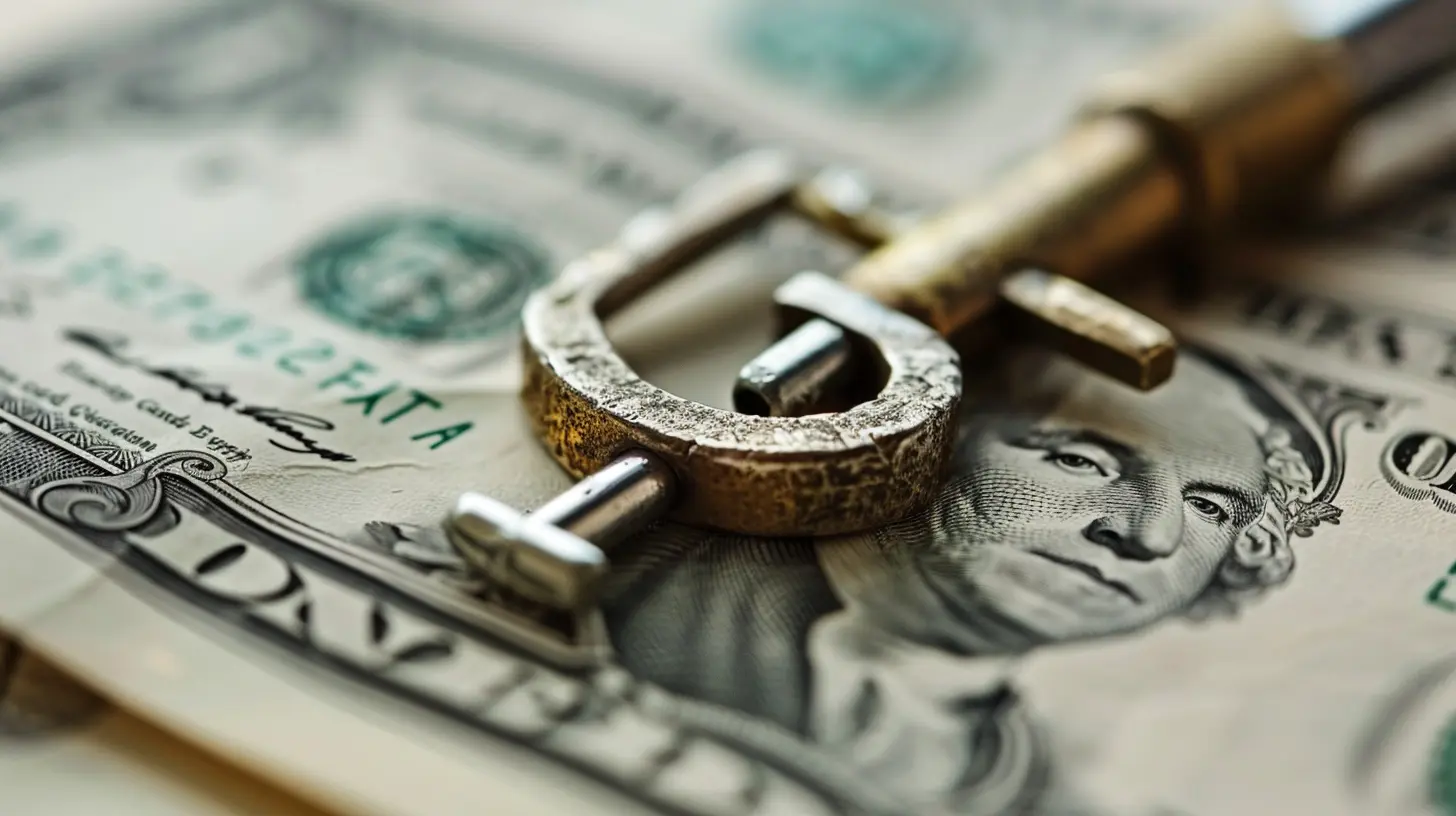Protect Your Financial Information with Privacy Tools
3 May 2025
In today’s world, where everything from ordering groceries to managing your bank account happens online, protecting your financial information is more critical than ever. We’ve all heard the horror stories—hackers stealing personal data, phishing scams draining bank accounts, or identity thieves wrecking credit scores. If this doesn't keep you up at night, it probably should. But don’t panic yet! There are plenty of privacy tools available that can help you safeguard your financial life.

Why Should You Care About Your Financial Privacy?
Before we dive into the tools, let’s talk about why this is important. You’re probably thinking, "I’m not a millionaire, why would anyone want my financial details?" Here’s the thing: cybercriminals don’t care how much money you have. They target everyone, whether you’ve got $10 or $10,000 in your account. Once they get their hands on your information, they can use it for all sorts of nefarious activities—emptying your bank account, making unauthorized purchases, or even taking out loans in your name. Yikes.But the good news is that by using a few privacy tools and taking some simple precautions, you can make it much harder for anyone to get their hands on your sensitive financial data. Ready? Let’s go!

Common Threats to Your Financial Information
Before you can protect yourself, it's crucial to understand the risks. Here are some of the most common ways bad actors target your financial info:1. Phishing Scams: These are fraudulent attempts to steal your information by pretending to be a legitimate company, often via email or text messages.
2. Data Breaches: Even major companies can have security flaws, and when they do, your information may be compromised.
3. Public Wi-Fi: Using unsecured, public Wi-Fi networks can expose your data to hackers who are lurking on the same network.
4. Malware and Ransomware: Downloading suspicious files or apps can infect your device, allowing hackers to snoop around for sensitive information.
5. Social Engineering: This is when hackers manipulate you into giving up personal information, often by pretending to be someone you trust.
Now that you know the threats, let’s look at the privacy tools that can help protect your financial data. Trust me, these are game-changers.

Top Privacy Tools to Protect Your Financial Information
1. Password Managers
Let’s be real—most of us are guilty of using the same password for multiple accounts. "123456" or "password" might be easy to remember, but they are also easy for hackers to guess. A password manager can change the game.A password manager stores all your passwords in an encrypted vault, allowing you to create strong, unique passwords for every account without the hassle of remembering them. Think of it like having a digital safe for your passwords, and you only need to remember one master key to open it.
Recommended Password Managers:
- LastPass- Dashlane
- 1Password
Most password managers also offer features like two-factor authentication (more on that next), so you’re double-covered.
2. Two-Factor Authentication (2FA)
If passwords are your first line of defense, two-factor authentication is your backup. 2FA requires you to provide two forms of identification before accessing an account—usually something you know (like your password) and something you have (like a code sent to your phone). This makes it much harder for hackers to break into your accounts, even if they somehow get your password.Many financial institutions and online services now offer 2FA, and it’s a good idea to enable it wherever possible. It’s like putting a deadbolt on your front door.
Popular 2FA Apps:
- Google Authenticator- Authy
- Microsoft Authenticator
3. Virtual Private Networks (VPNs)
Ever notice how your phone or laptop automatically connects to any available Wi-Fi network, even public ones? While convenient, this can be risky. Public Wi-Fi networks are prime hunting grounds for hackers. A Virtual Private Network (VPN) encrypts your internet connection, keeping your data safe from prying eyes, even on unsecured networks.Think of a VPN like a secret tunnel that hides your online activity from anyone trying to track or steal your information. It’s especially crucial if you’re doing online banking or shopping while using public Wi-Fi.
Trusted VPN Services:
- ExpressVPN- NordVPN
- CyberGhost
4. Encrypted Email Services
Most of us don’t think twice about sending financial information over email, but standard email services like Gmail or Yahoo are not entirely secure. Encrypted email services ensure that only the intended recipient can read your messages, which is vital when you’re sending sensitive info.Encryption scrambles your email so that even if someone intercepts it, they won’t be able to make sense of the content. It’s like sending your message in code, and only the recipient has the key to decipher it.
Encrypted Email Services:
- ProtonMail- Tutanota
- Mailfence
5. Secure Browsers
If you’re serious about protecting your financial information online, using a secure browser is a must. Secure browsers prioritize your privacy by blocking trackers, encrypting your data, and even hiding your location.Google Chrome might be convenient, but it’s not the most privacy-friendly option. Instead, consider secure browsers that are specifically designed to protect your data.
Best Secure Browsers:
- Brave Browser: Blocks ads and trackers automatically.- Tor Browser: Offers complete anonymity by bouncing your connection through multiple servers.
- Firefox: With a few privacy extensions, Firefox can be a strong contender.
6. Antivirus Software
Malware and viruses can lurk in the shadows, waiting for the perfect moment to steal your financial data. That’s why a robust antivirus program is non-negotiable. These tools scan for malicious software and remove it before it can do any harm.While most operating systems come with some form of built-in protection, third-party antivirus software often offers more comprehensive features, including real-time monitoring and ransomware protection.
Best Antivirus Programs:
- Bitdefender- Norton
- Kaspersky
7. Credit Monitoring Services
Even with the best privacy tools, there’s still a chance your financial information could be compromised. That’s where credit monitoring services come in. These services keep an eye on your credit reports and alert you if there’s any suspicious activity, like someone opening a new account in your name.Some credit monitoring services also offer identity theft protection and even insurance in case your personal information is stolen.
Popular Credit Monitoring Services:
- Credit Karma- Experian
- IdentityForce
8. Ad Blockers and Tracker Blockers
Ever notice how ads seem to follow you around the internet? That’s because websites use trackers to collect data on your browsing habits—and some of this data can include financial information. By using ad blockers and tracker blockers, you can prevent these sneaky trackers from collecting your data.Popular Ad Blockers:
- uBlock Origin- Privacy Badger
- AdGuard

Bonus Tips for Protecting Your Financial Information
Okay, now that we’ve covered the major privacy tools, here are some additional tips to keep your financial data safe:1. Avoid sharing personal information over the phone or email unless you’re absolutely sure who you’re talking to.
2. Keep your software updated. Hackers often exploit vulnerabilities in outdated software.
3. Enable alerts for your financial accounts so you’ll get notified immediately if there’s any suspicious activity.
4. Don’t overshare on social media. Hackers can use personal details like your birthday or pet’s name to guess your passwords or security questions.
Conclusion: Take Control of Your Financial Privacy
At the end of the day, protecting your financial information doesn’t have to be a daunting task. With the right privacy tools—like password managers, VPNs, and two-factor authentication—you can significantly reduce your risk of falling victim to cybercrime. You’ve worked hard for your money; don’t let hackers take it away. Taking a few proactive steps today can save you a lot of headaches (and dollars) down the road.So, what are you waiting for? Start implementing these privacy tools now, and sleep a little easier knowing your financial information is secure.
all images in this post were generated using AI tools
Category:
Privacy ToolsAuthor:

Pierre McCord
Discussion
rate this article
4 comments
Lysara Bryant
Utilizing robust privacy tools is essential for safeguarding your financial information against increasing cyber threats. Stay informed.
May 7, 2025 at 4:03 PM

Pierre McCord
Thank you for your comment! You're absolutely right—strong privacy tools are crucial for protecting our financial data in today's digital landscape. Staying informed is key to staying safe!
Idris McGovern
In an era of increasing cyber threats, utilizing privacy tools is essential for safeguarding your financial information. Implementing strong encryption, password managers, and secure browsing habits can significantly reduce the risk of identity theft and unauthorized access. Stay vigilant.
May 7, 2025 at 4:07 AM

Pierre McCord
Absolutely! Prioritizing privacy tools is crucial in today's digital landscape. Strong encryption and secure habits are key to protecting your financial information. Stay safe!
Renee White
This article highlights essential privacy tools that empower users to safeguard their financial information effectively. A must-read for security-conscious individuals!
May 6, 2025 at 2:27 PM

Pierre McCord
Thank you for the positive feedback! I'm glad you found the article valuable for enhancing financial security.
Kael Benton
Great article! It's essential to prioritize privacy in today’s digital world. I’d love to see more recommendations on specific tools and strategies for enhancing online security further. Thank you!
May 5, 2025 at 4:11 AM

Pierre McCord
Thank you for your feedback! I'll definitely consider adding specific tools and strategies for online security in future articles. Stay tuned!



